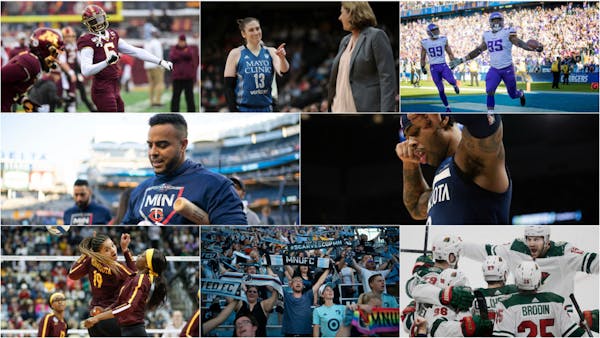 See
more of the story
See
more of the story
The pandemic will alter sports. Sports media has already changed.
Just a couple of decades ago, sports writing was a more personal and sometimes strange enterprise. A much higher percentage of interviews were conducted one-on-one, without help or interference from the team. Professional locker rooms had more of a Wild West feel. Ask a tough question and you might get the journalistic equivalent of a badge, or just a black eye.
Now, players have more places to hide in locker rooms, access has been whittled and group interviews organized by the team are the norm.
The result is a more professional working environment that reduces the possibility of intensely personal conversations.
As we inch toward sporting normalcy, here are a few stories I had forgotten I had forgotten. None of these stories would occur today:
• In December of 1994, Bill Blair was in his first season as the Wolves' coach.
Blair and the Wolves lost to the Suns one night. In the postgame news conference, Blair said his most talented player, J.R. Rider, needed to "grow up."
I bolted from the media room to the locker room and caught Rider as he was leaving. What happened next had never happened to me before, and hasn't happened since. Rider said, "Yeah, I have a response. Where are they, in the press room? Come on, I'll show you my response."
Rider walked to the media room and announced: "I want to announce my own news conference. Call the news." And then he argued with Blair.
On a subsequent Wolves trip to Utah, I was working out in the gym where the team was staying when Blair walked in.
Wolves employees had told me he hated me for causing the showdown with Rider. Blair stared daggers for 20 minutes before I told him that I didn't intend to cause him problems.
Suddenly, Blair opened up to me about ... everything. In 20 minutes, I had gone from Enemy of the State to confidant.
• The Vikings claimed Cris Carter off waivers for $100 in September of 1990. I had just arrived in Minnesota to cover the team. During the 1991 training camp, I told him I wanted to write a comprehensive story about his problems in Philadelphia.
He said, "OK, I'll talk to you, but if you mess me up, I'm going to punch you in the eye."
We talked. He was gracious. He did not punch me in the eye.
• In one of Jerry Burns' last seasons as Vikings coach, the team practiced in Tampa in December before playing the Bucs.
Merrill Swanson was the team's media relations director, and he recommended that St. Paul Pioneer Press beat writer Gregg Wong and I conduct our post-practice interview with Burns in one of our rooms in the nearby hotel.
Wong and I filled a bathtub with Burns' favorite beer. He walked in, grabbed one, sat down and began telling the funniest stories we had ever heard.
We waited too long to ask about the news of the day. Burns got up, walked to the tub, looked back at us and said, "When the beer's gone, so I am." And he walked out.
• These days many coaches and managers try to avoid saying anything that will go viral on social media.
In the spring of 1994, Twins manager Tom Kelly was saddened by the decision to cut two-time World Series champion Gene Larkin to make room for prospect David McCarty, viewed as a silver-spoon kid from Stanford.
Asked about McCarty, Kelly answered, "Stanford, boola, boola, boola."
Back then you couldn't "fire that quote through the internet,'' to quote Ron Gardenhire.
• Clubhouse access was ridiculously open in Major League Baseball, especially with the Twins, in the '90s.
Want to talk to Kirby Puckett one-on-one? Just get to the spring training clubhouse at 5:30 a.m., when he was the only player there, eating bagels that he brought in for the clubhouse workers.
"This time of day, this place is my castle," he would say.
• Twins prospect Bernardo Brito had become one of the greatest minor league home-run hitters in history, but couldn't win a regular big league job. One day I walked into the Metrodome as he was walking out. "I just signed to play in Japan," he said.
He had to leave immediately. So I drove him to the airport and interviewed him as he held my tape recorder.
Modern sports media coverage has improved in many ways. It's more comprehensive and immediate, and usually there's a media relations employee available to keep you from getting punched in the eye.
But sports coverage will never be as wild and personal as it was just a couple of decades ago, when a basketball player might walk into a news conference and say, "Call the news."
Jim Souhan's podcast can be heard at TalkNorth.com. On Twitter: @SouhanStrib. • jsouhan@startribune.com



